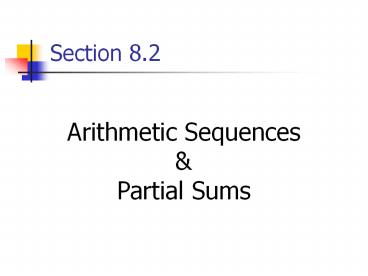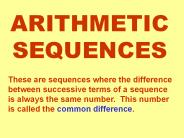Arithmetic Sequences - PowerPoint PPT Presentation
1 / 10
Title:
Arithmetic Sequences
Description:
Section 8.2 Arithmetic Sequences & Partial Sums Arithmetic Sequences & Partial Sums Arithmetic Sequences & Partial Sums Arithmetic Sequences & Partial Sums Arithmetic ... – PowerPoint PPT presentation
Number of Views:126
Avg rating:3.0/5.0
Title: Arithmetic Sequences
1
Section 8.2
Arithmetic Sequences Partial Sums
2
Arithmetic Sequences Partial Sums
A sequence in which a set number is added to
each previous term is called an arithmetic
sequence.
Definition of Arithmetic Sequences A sequence is
arithmetic if the difference between consecutive
terms are the same. So, the sequence
a1, a2, a3, a4, , an, Is arithmetic if
there is a number d such that a2 a1 a3
a2 a4 a3 d
3
Arithmetic Sequences Partial Sums
Examples
Determine if the following sequences are
arithmetic, and if so, determine the common
difference, d.
4
Arithmetic Sequences Partial Sums
How does one determine a particular term in a
given sequence?
The nth term of an Arithmetic Sequence The nth
term of an arithmetic sequence has the form
an a1 (n 1)d where d
is the common difference between
consecutive terms of the sequence.
5
Arithmetic Sequences Partial Sums
Examples
1. Find the 40th term of the sequence where a1
4 and d 2.
2. Determine the formula for the sequence
described in 1.
6
Arithmetic Sequences Partial Sums
7
Arithmetic Sequences Partial Sums
Examples
2. Find the sum of the 10 terms defined by
an 3n 4
1. Find the sum of the first 20 multiples
of 4.
8
Arithmetic Sequence Partial Sum
Example
An auditorium has 30 rows of seats. There are 15
seats in the first row and then an additional
seat added on each end in each row thereafter.
What is the seating capacity of the auditorium?
9
Arithmetic Sequences Partial Sums
What you should know
1. Apply the formula for an arithmetic sequence.
2. Apply the formula for finding the nth partial
sum of an arithmetic sequence.
10
Homework
- Page 598-599
- 2-26 even, 27-33 odd, 36, 38, 44, 54-60 even,
75-79 odd































